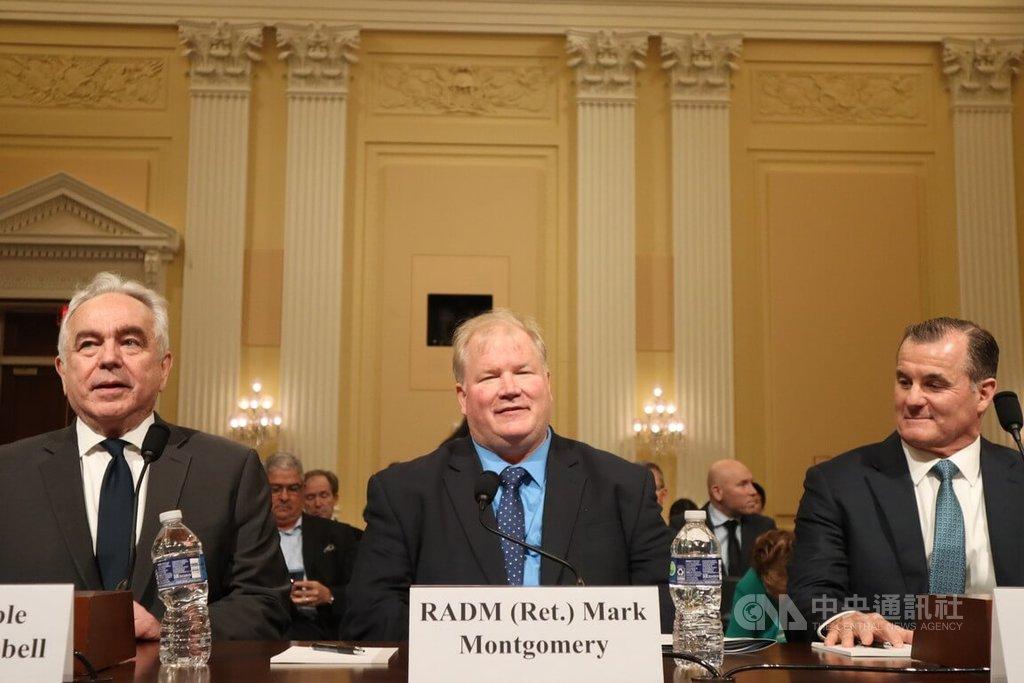Three former US military and political leaders yesterday recommended that Taiwan reasonably increase its defense budget, and the US military increase its training in Taiwan and forces in the Indo-Pacific region to deter Chinese aggression.
The US House Select Committee on Strategic Competition between the US and the Chinese Communist Party held a hearing titled “Deterrence Amid Rising Tensions: Preventing CCP Aggression on Taiwan,” inviting retired US army general Charles Flynn, former deputy secretary of state Kurt Campbell and retired US navy rear admiral Mark Montgomery to give testimonies.
Montgomery said that the US joint training mission in Taiwan should be expanded from 500 to 1,000 personnel, and advocated that Taiwan’s defense budget should reach 5 percent of GDP by 2028.

Photo: CNA
The US has never formally announced the number of troops it has stationed in Taiwan.
The US Congress passed the Taiwan Enhanced Resilience Act in 2023, instructing the executive branch to train Taiwanese troops, but the Ministry of National Defense has been slow to make progress, Montgomery said.
Taiwan still needs the investment and participation of the US military to establish an effective deterrence force with appropriate combat capabilities, he said.
Flynn also emphasized the importance of US military training.
The US could provide Taiwan with 400 Harpoon missile systems, but it is useless if Taiwan does not have teams that know how to operate, deploy and manage these systems, Flynn said.
US military training would help Taiwanese troops understand how to implement defense in depth, which is “the key value we bring as a training unit,” he said.
President William Lai (賴清德) announced a special budget in February, with the goal of increasing defense spending to at least 3 percent of GDP.
US Representative Dusty Johnson said that there is no consensus within Taiwan’s divided government to reach this 3 percent goal, questioning whether Montgomery’s proposed 5 percent goal is feasible.
Montgomery said that by spending 5 percent of GDP on the military, Taiwan would be able to purchase all the systems it needs and establish real combat readiness.
Historically for democratic countries, 5 percent is an achievable standard, he said.
Having a military budget equal to 10 percent of GDP is unrealistic for Taiwan, as this would mean purchasing US$40 billion in Foreign Military Financing (FMF) equipment from the US every year, he said.
“I believe everyone is well aware that we currently cannot even provide US$350 million of FMF annually,” Montgomery said.
Unless the Foreign Military Sales system is completely transformed and its efficiency improved by 1,000 percent, Taiwan’s military budget would not be able to reach 10 percent of its GDP, he said.
Campbell, who left office in January, said that while it is crucial to focus on what Taiwan needs to do and how to support Taiwan, the US must continue to strengthen its own capabilities and shift more forces to the Indo-Pacific region.
“We are the ultimate backing force,” Campbell said.
It is in US interests to continue supporting Taiwan, Campbell said, highlighting the achievements Taiwan has made over the past four years in technology, politics and strategy with US backing.

Alain Robert, known as the "French Spider-Man," praised Alex Honnold as exceptionally well-prepared after the US climber completed a free solo ascent of Taipei 101 yesterday. Robert said Honnold's ascent of the 508m-tall skyscraper in just more than one-and-a-half hours without using safety ropes or equipment was a remarkable achievement. "This is my life," he said in an interview conducted in French, adding that he liked the feeling of being "on the edge of danger." The 63-year-old Frenchman climbed Taipei 101 using ropes in December 2004, taking about four hours to reach the top. On a one-to-10 scale of difficulty, Robert said Taipei 101

Nipah virus infection is to be officially listed as a category 5 notifiable infectious disease in Taiwan in March, while clinical treatment guidelines are being formulated, the Centers for Disease Control (CDC) said yesterday. With Nipah infections being reported in other countries and considering its relatively high fatality rate, the centers on Jan. 16 announced that it would be listed as a notifiable infectious disease to bolster the nation’s systematic early warning system and increase public awareness, the CDC said. Bangladesh reported four fatal cases last year in separate districts, with three linked to raw date palm sap consumption, CDC Epidemic Intelligence

Two Taiwanese prosecutors were questioned by Chinese security personnel at their hotel during a trip to China’s Henan Province this month, the Mainland Affairs Council (MAC) said yesterday. The officers had personal information on the prosecutors, including “when they were assigned to their posts, their work locations and job titles,” MAC Deputy Minister and spokesman Liang Wen-chieh (梁文傑) said. On top of asking about their agencies and positions, the officers also questioned the prosecutors about the Cross-Strait Joint Crime-Fighting and Judicial Mutual Assistance Agreement, a pact that serves as the framework for Taiwan-China cooperation on combating crime and providing judicial assistance, Liang

US climber Alex Honnold left Taiwan this morning a day after completing a free-solo ascent of Taipei 101, a feat that drew cheers from onlookers and gained widespread international attention. Honnold yesterday scaled the 101-story skyscraper without a rope or safety harness. The climb — the highest urban free-solo ascent ever attempted — took just more than 90 minutes and was streamed live on Netflix. It was covered by major international news outlets including CNN, the New York Times, the Guardian and the Wall Street Journal. As Honnold prepared to leave Taiwan today, he attracted a crowd when he and his wife, Sanni,